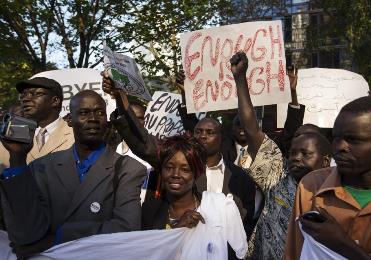Juba clarifies public media blackout on Abyei referendum campaigns
October 17, 2013 (JUBA) – South Sudanese government on Thursday justified its decision to ban public media from covering and publishing all announcements and mobilisation campaigns in support of a proposed referendum on Abyei.

Senior officials, including information minister Michael Makuei Lueth, have also asked editors and senior reporters from both public and independent media houses, as well as opinion writers to “observe ethics and objective” reporting.
He further stressed that all media coverage should reflect public interest on issues relating to the conduct of a planned referendum to determine the fate the contested region of Abyei.
“The suspension was done to allow the government [to] put in place processes for [the] Abyei referendum in an organised and responsible manner”, he said.
“I have seen that the process is being abused. There are some people who just show up at the station to talk unnecessarily”, he added.
Lueth said the measures are being put in place to prevent media representatives making irresponsible or incorrect statements on the issue.
They (media organisations) need to be guided by allowing them to comment on the issues they think they have clear knowledge about, instead of making it an open talk show”, he said
South Sudanese officials complained from the abrupt shift in the nature of the campaign for Abyei referendum saying some guests in radio and TV shows made irresponsible statements against the government, African Union and Sudanese government.
Lueth, who was speaking on behalf of the government, made the remarks at a press briefing on Thursday, during which he explained that public media should not be used responsibly in order to avoid misinterpretations.
“We know that there is a campaign for the people of Abyei to be mobilised to return to their homes so that they take part in the all the processes of the referendum when necessary arrangements have been [put] in place, but this mobilisation must be carried out in a responsible manner so that it avoids misinterpretations, especially when these activities are broadcast by the government media”, he said.
Lueth said he had taken the decision to suspend state-owned television and radio broadcasts until proper processes are put in place, adding that the ban only referred to programs and segments that may lead to confusion about the referendum.
“I have said already that programs related to the conduct of [the] Abyei referendum will be run when the necessary preparations are in place. We are doing this to avoid generating confusion and misunderstanding”, he said.
The minister confirmed observations that his government does not want to be implicated in the conduct of a unilateral referendum which has not been agreed upon by the two countries.
A vote on Abyei was due to be conducted simultaneously with the 2011 referendum on the secession of the South, but failed to take place because the two parties could not agree on who was eligible to vote.
The African Union (AU) had proposed holding a referendum on the future of the oil-producing region this month, but Sudan has rejected the plan, saying a joint administration and public institutions should be set up before any vote on the issue.
“So it is this failure to agree on the referendum laws and set up a joint administration which was proposed by the African Union for Abyei that will probably delay the vote, but we are ready on our side. What we do not want as a government is the involvement in activities which may cause confusion and some misunderstandings”, Lueth said.
The proposal to hold a referendum on Abyei fate in October 2013 had been made by Thabo Mbeki, the head of the African Union panel on Sudan and South Sudan. But Khartoum rejected it from the very beginning and the African Union did not support it.
However following the recent rapprochement between the Sudanese and South Sudanese governments and their agreement to normalise bilateral relations, Abyei civil society groups put pressure on Juba to reach a deal over the disputed region.
The referendum campaign, under the current power struggle in Juba, turned out to be used against Salva Kiir and his government, observers say.
(ST)
